This is a translation of the analysis that originally appeared at Colonelcassad Blog
The defeat of ISIS and the demise of this quasi-state is going to change the conflicts in Iraq and Syria. The conflicts between the previously neutral or previously partnered sides now take center stage. In the last months we saw tensions rising between the Syrian Arab Army and Syrian Democratic Forces, between Iraq and Iraqi Kurdistan, between Russia and the US. These conflicts are rooted in both economic and military-political reasons. The Caliphate’s defeat would bring a scenario where all the sides that had come into control of certain territories by military means would try to keep them during the post-war negotiations concerning the fate of Syria and Iraq. The struggle for cementing the positions leads the sides to race for control of territories with strategic or economic value. Syria is a clear example of this, with the race to Resafa or with the race to the Syrian-Iranian border circumventing At Tanf leading to clashes between Russia-backed and the US-backed forces. We see it now with the race for the oil of Deir ez-Zor province. Despite all the territorial or strategic needs, the oil is the lynchpin in all this. The oil is a chief concern for Russia and the US from an economical standpoint, hence the presence of Russian and US oil companies in the region. There is nothing surprising about the fact that the key events in these wars are playing out near the largest oil fields formerly controlled by the Caliphate, and that oil would play an important part in forming the borders of the post-war establishment in the region.
Iraq
Following the occupation of Iraq in 2003, the US oil companies rushed in after the troops, and, as part of “Restoration of Iraq” campaign, started pulling oil in the interest of the new masters of Iraq. In due time the other companies were allowed into the market, like French Total and Russian Lukoil, for example. The Caliphate’s appearance in 2013-2014 changed everything in the oil sector of Iraq. Captured by the Caliphate militants, some oil wells and factories stopped working legally, instead working for the “Global Jihad”, with a number of countries ready to help transferring the Caliphate’s oil for damping prices. This supplied the regime in Raqqa with considerable money, which was used to maintain its army, recruit numerous allies and prepare various jihad-inducing events. Nevertheless, even during the war against the Caliphate, the companies in the territories controlled by the Iraqi and Iraqi Kurdistan governments still produced oil, including Russian ones.
In 2017, the Russian state-owned company Rosneft entered Iraqi Kurdistan, with the help of its Chinese friends. That’s nothing unusual for Rosneft in the Middle East. The recent privatization of Rosneft was done by, among others, Qatar QIA fund. This happened despite Qatar being in prime opposition to Russian-Iran coalition, until the conflict between Saudi Arabia and Qatar had made the Emir of Qatar change his tune. Nevertheless, the Qatar deal didn’t work out because of political and economic reasons. CEFC China Energy tried to make a deal with Qatar as intermediary, but complications arose due to problems with controlling its organs. This led to possible sequestration of company accounts, so Russia had to close the deal with credit under the risk of serious economic and reputation damages. This once again proves that Qatar isn’t the most reliable partner in the Middle East, and that risk should always be accounted for when dealing with China, both in this case and in the case of joint projects in Kurdistan. Otherwise the expenses might end up too high. Considering China’s economic interest in the region and its potential role in restoration of Syria and Iraq, China and Russia will be partners and competitors in the region at the same time. This is inevitable in a political and economic sense, and the results of this cooperation will depend on their respective leaderships.
Anyway, this complication did not stop Rosneft from entering Iraqi Kurdistan. Rosneft opened an office in Erbil and commenced work on big infrastructure projects, which neither the US, nor Baghdad liked, the latter deeming the deal “illegal”. Both Russian and the US oil companies are operating in an unstable region on the brink of war, where local governments struggle for control of oil deposits. The recent retaking of Kirkuk and nearby oil deposits by Iraqi Army and Shi’ite militia demonstrates the acuity of struggle, which concerns both local governments and oil companies. In this regard the economic interests of oil companies have to take the military-political contradictions into account. The US project of autonomous/independent Kurdistan is met with resistance from Iraq, Iran and Turkey. Russia tries to stay out of this, supporting relations with both Baghdad and Barzani. Baghdad is not satisfied with this and tries to do everything it can to sway Russia to give more support to the official Baghdad’s position of opposing Barzani and US intentions. Russia does not relent, and while it officially supports the territorial integrity of Iraq, Russia cooperates with both sides of the conflict: Iraq gets weapons from Russia, but at the same time Russian oil companies enter Kurdistan with the approval of Erbil.

An Abrams battle tank of the Iraqi Army destroyed by the Peshmerga. Click to see the full-size image
The conflict in Kirkuk, having led to clashes between Iraqi government forces and the Peshmerga, threatens these plans. If the conflicts were to intensify, Baghdad and Tehran attempts of diminishing Barzani’s influence would jeopardize Russian oil companies in Kurdistan. Although there is still a possibility that if the territory changes hands, Russia will manage to make a deal with Baghdad in order to continue working in the region, doubly so, considering that Iraq understands Russia’s support is vital for Iraq to keep its territories intact. The cooperation of Russia, Iran and Iraq as part of Bagdad Information Center and other organizations leaves them open to balance out their positions. It is also worth remembering that Iran, being Russia’s main partner in the coalition, has a lot of influence over Iraq’s government. Russia will remain in the region no matter what happens between the Iraqis and the Kurds, with Russia distancing itself from them as much as possible and urging conflicting sides to negotiate within Iraq’s territorial integrity framework, letting the US and Iran deal with each other in Iraq.
Syria
Russian oil companies reported fully reestablishing their operations in Syria back in summer of 2015, when stabilizing the situation in the region had been deemed necessary to continue working. Now the situation is far from fully stabilized, even though the situation has changed considerably in two years of Russian presence in Syria.
The oil and gas sector in central Syria is largely under control. The recovery efforts are starting to take place there, as without these resources Assad won’t be able to see through the recovery of the Syrian economy even with help from Russia, China and Iran. Russia’s oil sector showed interest in developing Syria’s oil deposits last summer, and some sources stated that Russia is promised, apart from the military bases, up to 25% of Syria’s oil and gas sector as compensation for support in the war.
The US won’t help, so Damascus expects the countries mentioned above to participate and help in reestablishing control over the oil fields of Eastern Syria and their reintegration into Syria’s economy. Russia and Iran help the Syrian Arab Army, and China promises to invest considerably after the situation stabilizes. It is important to bear in mind, however, that the US and its allies have their own ideas about Syria.
According to the US, the Syrian conflict should continue even after the Caliphate is defeated, which we can see in southern Syria, where the US are occupying At Tanf, and north-eastern Syria, where the US uses the Kurds to take control of oil deposits in the north of Deir ez-Zor province. The recent successes of the Syrian Democratic Forces, having taken control of Omar oil fields and the conflict near Koniko gas fields, where Russian aviation hit the ISIS militants and also “clipped” Syrian Democratic Forces units there, reflect on the contradictions regarding the control over oil in Deir ez-Zor. The US needs the oil to economically secure the Kurdish project in Rojava, as this would make it more independent from Damascus. Assad and his allies are committed to reestablishing Syria’s control over the oil deposits: this would provide a basis for the post-war restoration projects, while Russia and China would satisfy the interests of their own oil companies, which would develop the deposits after the war is officially over. In this scenario, Iran would be able to build a “Shi’ite belt” from Tehran to Beirut across Syria.
Of course, there is no possible way to pull oil efficiently when there is a war going on nearby. High-profile companies tend to avoid such risks. Even using PMCs to secure the facilities wouldn’t guarantee total security, as it wouldn’t rule out threats of terrorist and suicide attacks, and the forays of not quite finished off Caliphate units. On this count the race for Deir ez-Zor’s oil will not only define the temporary border between Syrian Arab Army and Syrian Democratic Forces, but also will clear the region out of the considerable Caliphate forces there, which would have hindered the economic restoration of the oil deposits and facilities. As far as the Caliphate concerned, losing these deposits makes no difference, as Russian aviation in the region makes its impossible to pull and transport oil, diminishing the oil earnings in the Caliphate’s budget that’s been shrinking since 2016.
The rest will depend on whether the agreement with the Kurds is reached. If, in view of Russian efforts, Assad and the Kurds will come to terms in Damascus or Astana, then some temporary economic solutions will be put in place, with the Kurds deciding to forgo the separatist sentiment supported by the US in favor of their new role in the post-war Syria. If the agreement is not reached, then relatively soon the border between Syrian Arab Army and Syrian Democratic Forces may become a frontline, while the Syrian Army will not only aim to occupy the Tabqa region, but also to push the Kurds out of the oil deposits they would have had captured during the current race. A similar thing happened with the oil deposits near Kirkuk. This would heavily concern Russia, as it not only would threaten the post-war interests of Russian oil companies, but also would raise even more tensions with the US, who would take advantage of the conflict and hinder Russia’s attempts to end the war in Syria. Russia will try to evade escalating the situation, but if push comes to shove, I think Russia will take Assad’s side. Especially so, if the US tries to realize the final scenario of dismembering Syria’s territory using the Kurds.
Therefore political and economic conflicts between the sides fighting against the Caliphate are present and escalating even in Syria and Iraq. This is somewhat similar to the end of 1944 and the beginning of 1945, when with every loss the Third Reich took, the conflicts between the USSR, the US and the British Empire started rearing their heads more and more.
Now the sides of the conflict are concerned with the post-war political and territorial organization of Iraq and Syria, and also with securing positions to let them realize their strategic and economic plans in the region after the war. As Russian and Chinese companies demonstrated, some do not even wait for the war to end, and try to secure their positions even before everything is safe. This is a risk, but if Iraq and Syria remain wholesome states with singular governments, the risk will pay off, in my opinion. The US try to force the matter of control over the oil in Deir ez-Zor and Kirkuk by using the Kurds. Hence the escalation in the regions. The US considers the escalation to be an advantage in opposing Russia, Iran and China, therefore ending the war against the Caliphate will not mean achieving peace in the region. The oil in Iraq and Syria will be the main factor of conflict in the Middle East.




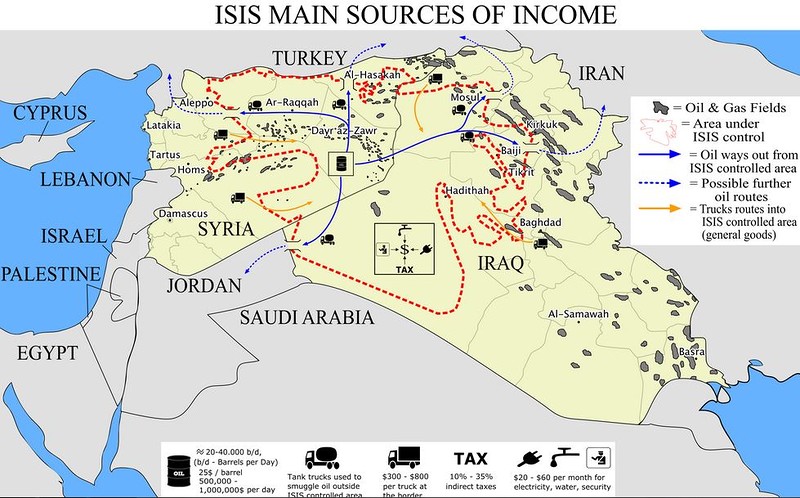
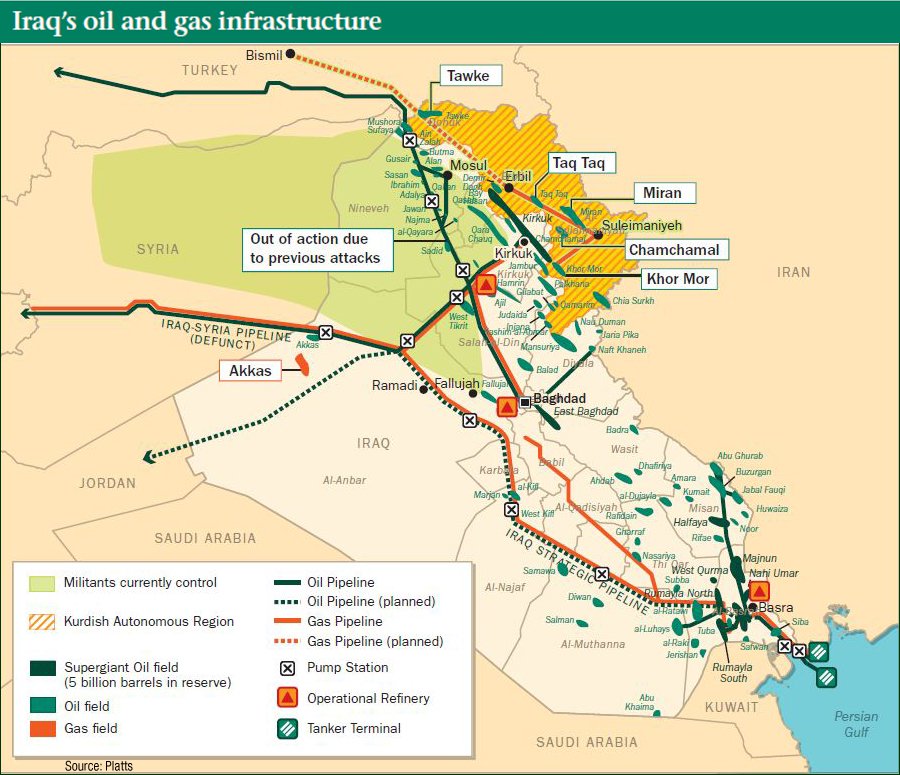
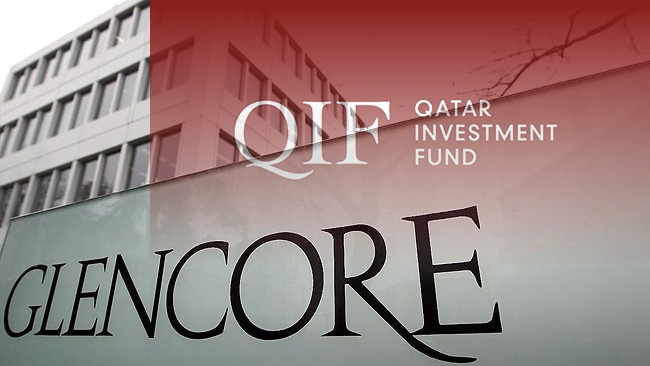
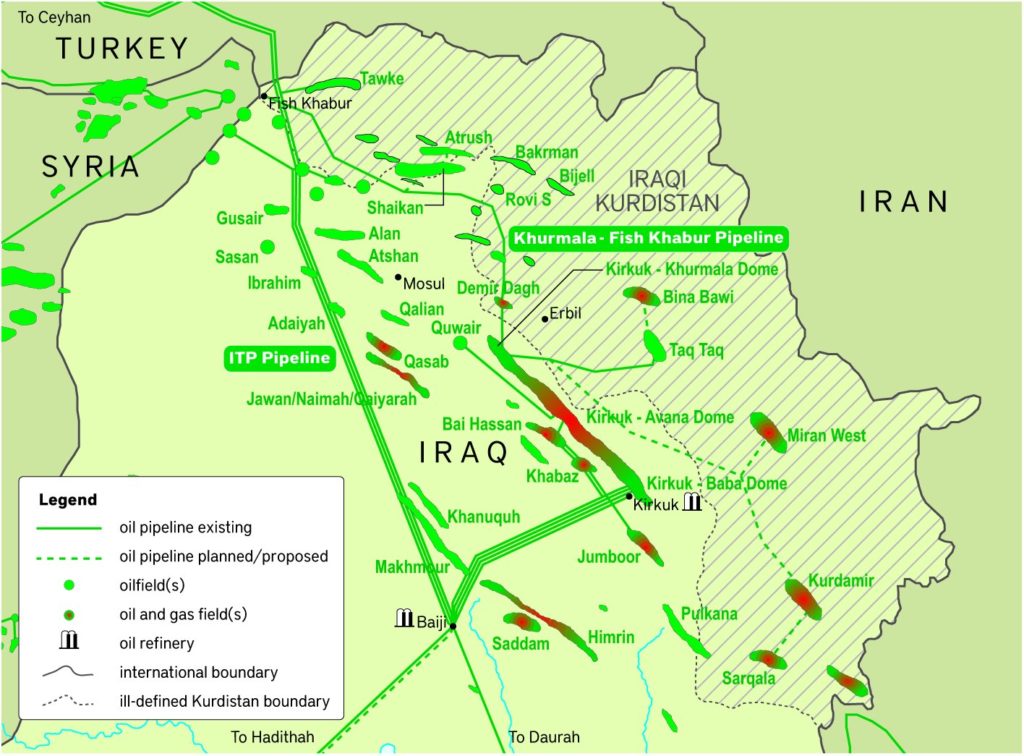
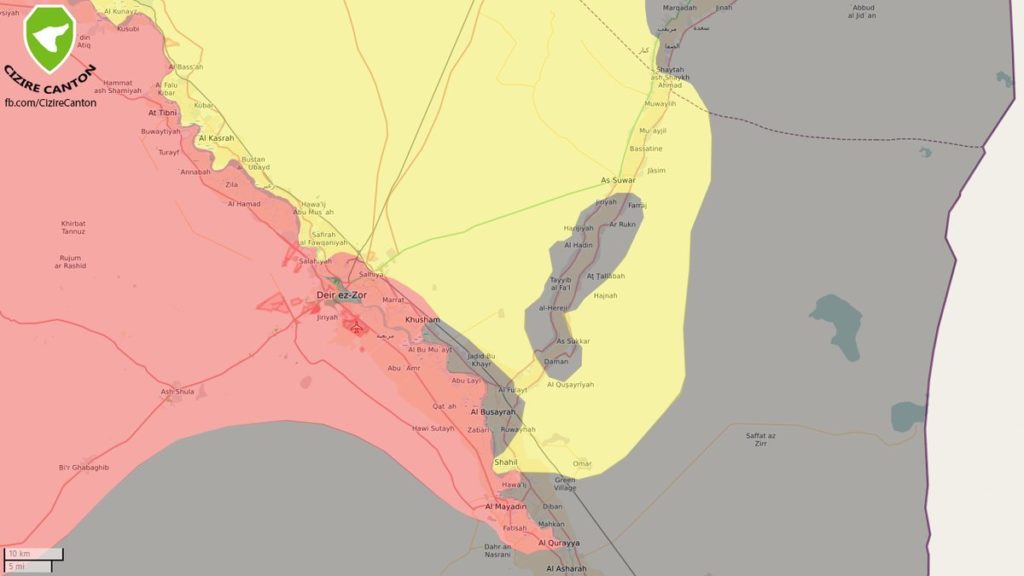
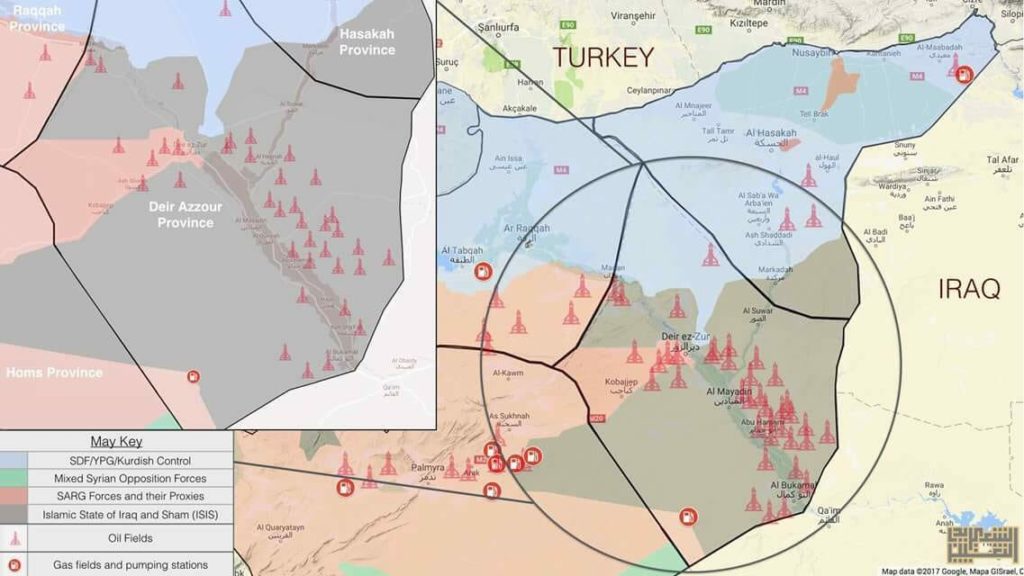



Article presupposes that oil is valuable today, but in fact there is a global glut of oil and everyone in Opec and Russia are trying everyday to keep the price above $40 bbl.
Iraqi/Syrian Oil is far more important to regional players: Turkey, Arabs & Persians and their proxies than it is to US, Russia & China.
Note: nobody in Texas wants to get their head chopped off by crazies in a war zone.
As far as Syria is concerned, fully agreed. Iraq is a global energy player. The rabbit in the hat is shale oil and gas. The impact of those is almost wholly unknown. A second rabbit is oil and gas in the sea, where one can expect finds like Israel has but on an unknown scale.
Oil is $55/barrel, on average. Shale is relatively new, and a lot riskier and more expensive to produce as compared to conventional oil.
The key underlying factor in recent developments in the region are likely attributable to warming relations between KSA and RF. From their point of view, price of oil is of utmost importance, and the recent re-positioning in Iraq and Syria may have to do something with that. It would be naive to look at developments in Syria as independent of those in Iraq.
The heyday of the super tankers moving oil around the world is probably over.
Nat Gas has increased its volume use in developed nations.
China seeks pipelines to import it’s oil/nat gas.
USN with Crazed Empire seek to cut China off from Malacca straits.
The bogus leverage over China and Islands is simply US having BS cause to stuff it’s Navy in and limit/intimidate China.
China/Russia have already decided that overland Eurasia energy routes is the future.
Eventually. ..Empire must attack that.
Saudis and Gulf can tanker their oil and LNG,…yet the cost is high vs the futures contracts.
Europe’s economy is not thriving to drive the futures volume contracts.
Some European nations with wealth may import to build up reserves,…especially if a War between US and Iran is considered possible/real soon.
If Said war dies occur, ….it’s probable Saudi oil terminals, water desalination plants could be destroyed/damaged….which could cause partial collapse of the Old King and Queen fields which need water injection.
If your Iran….you know you will get busted up but good….so,…do you make sure your
Evil neighbours gets the same outcome and left ruined aswell?
While you can’t solve Iraq without somewhat solving Syria, there really is very little Syrian oil involved.
Iraq & Syria have the bad luck to be located between rival regional powers: Turks, Persians & Arabs.
Thus they are trapped in a perpetual motion machine of conflict.
Oil is a valuable commodity even to the US, lower oil prices would put a lot of frackers out of business and cause a major default in the banking system. US found out this unpleasant detail when they tried to manipulate the oil price down to the low 20’s with the complicit help of the Saudis, in order to cripple the Russian economy.
As a result Russia tightened its belt, US determined it cannot use the oil weapon against the Russians, and the Saudis depleted several hundred billions from their cash reserves.
As written above US and others do have some notable sucesses growing by non fossil energy as well being less dependent.
EU has big plans for it and they are followed. The single states in US are investing a lot into it as well as the newcommers such as China and India.
You are right about the bank systems, but You are also wrong. USA, Westerns and even China are sekular flexible and can by that play on many horses and take in and out.
The oilexporters and gasexporters like Russia & Middle East are stif and are overwhelming depended by one product even fx egyption poptatoes are the best You can get here in wintertime and spring.
Saudi Arabia pulls in one billion a day selling oil , that is value .
Regarding Texas; the Texan , Bush senior , created Al Qaeda along with Bin Laden and the king of Saudi Arabia back in the early 80’s by revitalizing Wahhabi Islam to use as a weapon against Russia in Afghanistan . Those “crazies in a war zone” are the fruit of that creation.
That control ideology Wahhabism , America continues to support by supporting Saudi Arabia, its home .
Texas sell a little oil itself . Keeping heads on shoulders starts by not supporting the ideological home of the jihadist .
It’s not that simple, the antecedents of ISIS began with the creation of the Muslim Brotherhood. The US did assist the Afghan Rebels, some if whom were the Mujahideen. But after Afghan War ended with Russian defeat, the US basically left the area which enabled the Taliban who were sponsored by PAK intelligence to arise and Dominate Afghanistan.
Etc.
So yes, the US did play a role at some level; but there were plenty of other regional players far more involved than the US.
@ Kennrthllindsy ; It is that simple ;
the Muslim Brotherhood are Salafists . ( pure / original Islam )
Wahhabi’s are Salafist with Jihad as the goal .
Jihad is the “warrior of God” (mujahideen) converting by force .
Bin Laden’s criticism of the “Brotherhood” was the lack of focus on Jihad .
CIA flew hundreds of thousands of copy’s of the Koran with Wahhabi comments to Pakistan , to PAK intelligence .
Al Qaeda was born , from it Bin Laden left and formed the Taliban .
PAK intelligence contracted to Saudi Arabia , supported by John Brennan’s Co.
No one is more involved than the United States .
Using these “warriors of God” , in other nations , such as Iraq and Syria has cost the lives of hundreds of thousands of Christians there .
Are Texan Christians that much better than Iraqi Christians .
Maturity is accepting responsibility for one’s actions, when is Texas going to.
1001 night of arabian excuses again. The main things is, that You dont keep Your violent jihadists, whahabists whatever down.
We have our own problems too.
Yes , keeping jihadists down . A great American had this to say on that .
” I have sworn upon the altar of God , eternal hostility against every form of tyranny over the mind of man ” . Thomas Jefferson
Yes, its forgotten that EU and others are working hard replacing the importance of fossils. For me its still a surprice that the oilproducers only export oil/fuel and we not even see them upgrade producing even single plastic buckets and like that.
Its should be possible to the local markets, because the wages are low and save import as well. So many are unimployed.
This is excellent commentary and geologically correct. The major oil and gas fields to the north and east of the major oil pools of Kirkuk comprise substantial resources whose technical developement has lagged due to sustained conflict and lack of modern reservoir technology and investment. The area is hence critical geopolitically and economically to the increasingly financially fragile and deeply overindebted US economy whose currency has long been linked to oil to underpin its value. If this fails, the financial / economic underpin to the US dollar also fails and will accelerate a US$ collapse. Furthermore, if Russia, China and Iran establish a major economic and political “footprint” in this region with fully restored Syria and Iraq
US, UK and some European countries economy have already been collapsed and their survival is in danger now. Their finance ministers are unable to meet their budgets and demand for increase in cuts on expenses, increase in taxes, custom duties, student fees etc. Now the future of these countries is uncertain.
Rob, true and agree! They may actually implode before the US and the Catalan and Basque situation my bring Spain to its financial knees and then the EU will crumple like a pack of rotten dominoes. France is already a basket case.
Your versions are not correct. It being handled. You are right about the french version,but the parlament has changed for needed restructuring in a very positive by support for it.
I cant see any european economics are collapsed. Economics are fine compared to others even ift true, they are alost not growing.
You forget the level and a few % down here and there still gives a high level.
The version that the finance ministers are unable to do this and that is not true.Its a matter of own demand of more safety no matter what, which is made against unstability.
If Israel has its way,….US will attack Iran .
Said war will turn the ME into a maelstrom of chaos which would tumble World Markets.
No one’s putting pipeline routes in,…nor revive old defunct pipelines.
It actually profits Russia if the ME is tumbled. ..Europe has to pay 3x on US or other LNG vs Russia, …allong with limited volume oil imports.
USD gets thrashed. …Euro in trouble aswell.
Russia/China can make profits on reconstruction and loans. …Question is,…do they really want that expenditure in the ME,…or build up Eurasia. ..allong with new rail, electrical, train and roads
Builds in non war zones.
US have already tumbled the ME,…I’m thinking Empire wants the Chaos to migrate into Eurasia and ruin the plans if Russia and China as they build a non USD world.
Agree in part! One things for sure and you’re right – there’s going to be no end to war there as the stakes are way too high and there are a multiplicity of major and medium sized players and agenda’s based on religion, economics, finance and military objectives. The whole place is a powder keg.
superb – 1000 ticks.
>>with the race to the Syrian-Iranian border
I’m pretty sure you wanted to write “Syrian-Iraqi border” (unless there have been some drastical changes I wasn’t aware of ;) )
I dont see any race either :)
Dont forget it is also happening in Libya at this present moment. Robbing Muslim nations and branding Muslim as terrorist ,how low can these low life go to??
If a single American remains in Syria or Iraq – these two nations will have lost.
If the Kurds are allowed to plunder either country – Syria and Iraq will have lost.
The people of both nations and many millions of us around the globe are trusting in Putin and Russia to finish the job.
Don’t let us down.
Remember – if Russia lets down Iraq and Syria for any reason – but particularly over oil – who will trust it again.
It will have become tarnished as just another plundering entity.
Greed game:
Putin is a traitor of u.s.s.r.
this war is only to keep military spending, experimenting aircraft performance in desert region and of course the other bonus is Hollywood movies, books.
then there is more important keeping oil prices low by creating volatility. which means the fake futures maket based on fake science called mathematics will at their will and pleasure create technical problems to keep prices lower for longer or forever.
I blame the Iraq and Syrians for this. giving too much respect for authority serve them. these kings, mioitary are sleazeblall lowlife greedy sob’s bonr to whores.
You think former U.S.S.R president Gorbachev will do such crime of killing and displacing people of Syria etc?
all fall down. Putin Vladimir the protégé of the first traitor of modern U.s.s.r Vladimir lenin and Stalin joseph. the barbarians and stooges of the greedy bankers of London and wallstreet.
read the story in the greatest heist -Bolshevik revolution. that fcker Lenin facts should be rewritten to explain the truth. this fake leaders and stooges and their killing machine owning military is evrerywhere.
take india for example. Nehru and his daughters Indira with fake assumed name Gandhi’s. the entire family her son Rajiv all are fake. they have body doubles now.